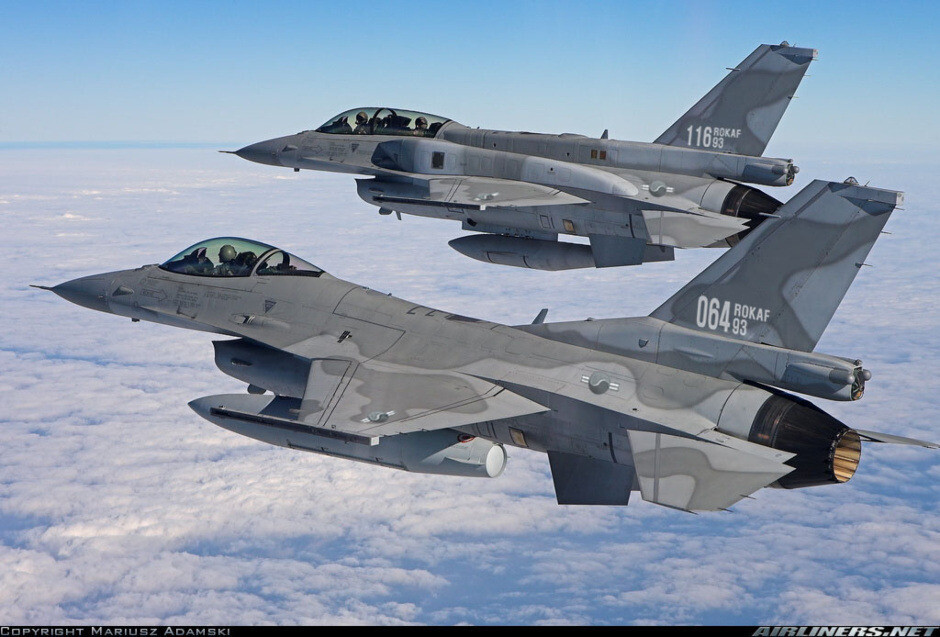hankyoreh
Links to other country sites 다른 나라 사이트 링크
DAPA bumbling on KF-16 fighters causes loss of nearly $100 million

The Defense Acquisition Program Administration (DAPA) caused nearly US$100 million won in losses attempting performance improvements for its KF-16 fighters without discussing the matter with Washington, a Board of Audit and Inspection (BAI) review showed.
The BAI announced on June 16 that its audit of the K-16 improvement project showed a delay of four years and losses of US$89 million (104 billion won) as a result of DAPA’s ill-considered measures. The board also called for the dismissals of two officers at the administration.
Launched in Dec. 2010 following a vote by the defense project promotion committee, the KF-16 improvement project involved upgrading outdated aviation electronics equipment on the fighter, which was introduced in 1994. The National Assembly moved to demand a BAI audit last December after setbacks in the project, including the replacement of BAE Systems with Lockheed Martin as operator.
According to the audit, DAPA adopted a foreign military sales (FMS) format for the project, with the US government assuming direct responsibility for business selection and quality assurance.
But the administration subsequently disregarded Washington’s FMS rules, moving to select an operator and negotiate costs through competitive bidding for commercial purchasing. US Defense Department instructions prohibit FMS from being conducted side-by-side with commercial purchasing. Indeed, the US military attempted to stop DAPA after it attempted to choose its own operator through competitive bidding, sending a notice that the negotiated price between the purchasing country and business would not be restricted by the US government.
It was a message that went unheeded by DAPA, which went ahead with the project after selecting BAE through competitive bidding with Lockheed Martin in July 2012. In the process, a DAPA official falsely reported to the defense project committee in Dec. 2013 that a total project cost of US$1.7 billion had been agreed upon with the US government - even though no such agreement had been made - and a primary contract worth US$184 million was signed with BAE.
But in Sept. 2014, the US government presented a higher project cost of US$2.4 billion, citing BAE’s lack of experience with such projects. The increase led to DAPA finally canceling its BAE contract in Dec. 2015 and signing again with Lockheed Martin for US$1.926 billion.
DAPA’s lone actions on the issue ended up causing a delay of four years and a loss of the US$89 million already spent pursuing the project with BAE.
DAPA was also found to have broken the rules in selecting an operator by allowing BAE to join the bidding despite its lack of experience in F-16 performance improvement projects outside the US. In the process, it accepted BAE’s request to alter its proposal after it had already been submitted, and adjusted its assessment method to give higher points than competitor Lockheed Martin in categories favoring BAE.
By Park Byong-su, senior staff writer
Please direct questions or comments to [english@hani.co.kr]

Editorial・opinion
![[Column] Season 2 of special prosecutor probe may be coming to Korea soon [Column] Season 2 of special prosecutor probe may be coming to Korea soon](https://flexible.img.hani.co.kr/flexible/normal/500/300/imgdb/original/2024/0426/3317141030699447.jpg) [Column] Season 2 of special prosecutor probe may be coming to Korea soon
[Column] Season 2 of special prosecutor probe may be coming to Korea soon![[Column] Park Geun-hye déjà vu in Yoon Suk-yeol [Column] Park Geun-hye déjà vu in Yoon Suk-yeol](https://flexible.img.hani.co.kr/flexible/normal/500/300/imgdb/original/2024/0424/651713945113788.jpg) [Column] Park Geun-hye déjà vu in Yoon Suk-yeol
[Column] Park Geun-hye déjà vu in Yoon Suk-yeol- [Editorial] New weight of N. Korea’s nuclear threats makes dialogue all the more urgent
- [Guest essay] The real reason Korea’s new right wants to dub Rhee a founding father
- [Column] ‘Choson’: Is it time we start referring to N. Korea in its own terms?
- [Editorial] Japan’s rewriting of history with Korea has gone too far
- [Column] The president’s questionable capacity for dialogue
- [Column] Are chaebol firms just pizza pies for families to divvy up as they please?
- [Column] Has Korea, too, crossed the Rubicon on China?
- [Correspondent’s column] In Japan’s alliance with US, echoes of its past alliances with UK
Most viewed articles
- 1‘We must say no’: Seoul defense chief on Korean, USFK involvement in hypothetical Taiwan crisis
- 2[Column] Season 2 of special prosecutor probe may be coming to Korea soon
- 3N. Korean delegation’s trip to Iran shows how Pyongyang is leveraging ties with Moscow
- 4Amnesty notes ‘erosion’ of freedom of expression in Korea in annual human rights report
- 5[Reportage] On US campuses, student risk arrest as they call for divestment from Israel
- 6Korea sees more deaths than births for 52nd consecutive month in February
- 7[Editorial] New weight of N. Korea’s nuclear threats makes dialogue all the more urgent
- 8‘Weddingflation’ breaks the bank for Korean couples-to-be
- 9[Column] Has Korea, too, crossed the Rubicon on China?
- 10[Column] Park Geun-hye déjà vu in Yoon Suk-yeol